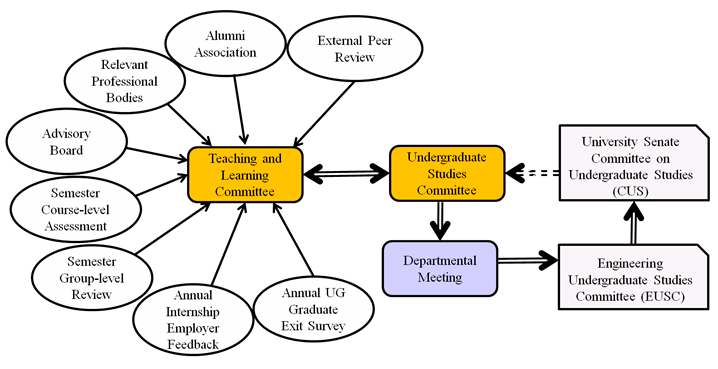Quality Assurance
The Department of Civil and Environmental Engineering is committed to maintaining its academic standards and enhancing the quality of teaching and learning. A quality assurance framework has been established to regularly assess and improve the level of achievement of intended programme outcomes in different perspectives. Inputs from various organizations, including the Advisory Board, Alumni Association, relevant HKIE Disciplines and professional bodies, distinguished professors and current students, are solicited. The Department holds meeting regularly with the aforesaid bodies to collect feedback from the stakeholders. In addition, the outcome-based assessment coordinator will review the information collected from four different yet complimentary layers: (1) semester-based course-level assessment; (2) semester-based group-level review; (3) annual internship employer feedback; and (4) annual UG graduate exit survey, and report to the Undergraduate Studies Committee for collective discussion.

External Review/feedback
-
HKIE Accreditation
The program has been accredited by the Hong Kong Institution of Engineers (HKIE). Graduates are eligible to apply for Graduate Membership in the HKIE. -
External Reviews
Distinguished professors were invited to conduct an individual, in-depth review of a sub-discipline in the Department of Civil and Environmental Engineering according to their specialty. Appropriate invitees are rotated from previous reviews to ensure a breadth of discipline investigation. -
Advisory Board Meetings
The Department invites Advisory Board members and outside professionals to review the academic programmes on a regular basis. The Department has its own Advisory Board since 1993. In 2016, there were 16 members in the Board, being prominent figures from the HKSAR Government, academic institutions or Industry.
Internal Assessment
-
Course level assessment
The course-level assessment is a semester-end student evaluation on the course contents and the learning outcomes they believe to have achieved. This course-level assessment is a good verification on the intended learning outcomes of all the courses offered in the Department. These course-level learning outcomes are the most essential ingredients of the programme outcomes. All of the students in a particular course are assessed by the same exams, assignments, and activities. Differences of individuals in the achievement on the intended learning outcomes (ILOs) and relevant program outcomes can be simply evaluated.
In addition, some of the courses are tentatively selected to conduct more detailed analyses to further check the degree to which the intended programme outcomes are attained in each year. -
Teaching evaluation results
The survey of teaching evaluation for each course is centralized by the Center for Education Innovation of the HKUST. The purpose of this survey is to provide information and feedback to instructors to improve the quality of teaching and learning. -
Group level assessment
There are different sub-disciplines in the department including Construction Management, Environmental, Geotechnical, Hydraulics, Material, Structural and Transportation. Faculty members in each group have regular meeting in each semester to review the attainment of course-level learning outcomes, to ensure the coherence and consistency among the courses offered by the group and to assess the courses’ effectiveness in meeting the programme outcomes. -
Student staff liaison committee meeting
The Student-Staff Liaison Committee meets regularly with student representatives to review and discuss feedback collected from students on academic programs and student matters. Appropriate follow-up actions and implementation process will be taken in regard to the comments and suggestions made by the students. -
Annual UG graduate exist survey
An annual exit survey is conducted to our graduates to solicit their learning experience as well as comments on how the programme can be improved. This survey contains several generic questions that are particularly designed to assess the ability of the graduates, e.g., the ability to apply mathematics, science, and engineering knowledge to solve problems. The level of achievement of programme outcomes can be assessed based on these survey results through a mapping between the questions in the exit survey and the program intended outcomes. -
Internship and employer feedback
Towards the end of the mandatory summer internship training for our 3rd year students, a feedback form will be collected from the internship employers who will assess the performance of our students under real-life working conditions. The Department also plans to conduct an employer survey to solicit the opinions from some of advisory board members, who are also the employers of our graduates. The survey results can give us a fair evaluation about the level of achievement of program outcomes from the employer’s point of view.
UG Program Curriculum
Enhancement of Teaching and Learning
-
Center for Engineering Education Innovation (E2I)
The Center for Engineering Education Innovation (E2I) was established by School of Engineering in 2010. Through various high-quality learning and development programs and activities, E2I aims to foster a learning culture by developing and sharing good practices in learning and teaching, assessment, and quality assurance. -
Center for Education Innovation
The Center for Education Innovation is an academic support unit which strives to proactively move forward HKUST's teaching and learning strategy.